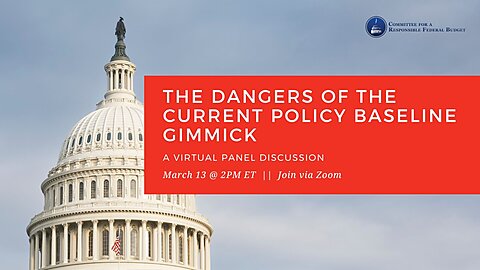Romina Boccia and Ivane Nachkebia
Today, March 13, at 2:00 PM, I’ll be joining a virtual event hosted by the Committee for a Responsible Federal Budget (CRFB) alongside Marc Goldwein (CRFB), George Callas (Arnold Ventures), and Bobby Kogan (Center for American Progress). We’ll break down the Senate’s proposal to use a “current policy baseline” to extend the expiring provisions of the Tax Cuts and Jobs Act (TCJA) and possibly renew the expiring Obamacare enhanced subsidies, and highlight the fiscal and political implications if the Senate gets its way. Register here to join the discussion via Zoom.
The 2017 tax cuts are set to expire at the end of 2025, and extending them is a key priority for President Trump and the Republican-led Congress. While the House budget resolution includes at least some spending cuts to partially offset the deficit impact, the Senate wants to take the easy way out—using a current policy baseline and ignoring the trillions the TCJA extension would add to the debt without offsets.
How this budget gimmick would work:
“Instead of recognizing that extending temporary tax cuts past their expiration date will add to the deficit, the Senate wants to claim that these tax cuts were always meant to be permanent. […] If the Senate’s plan succeeds, tax cut extensions won’t count as new costs, which means they don’t need to be offset to make the reconciliation budget math work.”
As Adam Michel, director of tax policy studies at the Cato Institute, notes:
“This [using a current policy baseline] sets the stage for no net spending cuts in the next package, letting the government grow on autopilot, effectively raising taxes on future Americans. The Senate budget will make pursuing a permanent, pro-growth tax bill more challenging by cannibalizing the easiest spending cuts for new spending instead of tax relief.”
A major reason why the Senate is pushing for this creative accounting that, according to CRFB, would add $3.4 to $4.6 trillion to federal deficits is that senators are reluctant to adopt politically contentious Medicaid spending reductions. However, as Paragon Institute’s Brian Blase points out, two major Medicaid reforms—limiting the provider tax scam and equalizing reimbursement rates between traditional (children, seniors, pregnant women, and people with disabilities) and expansion (able-bodied adults) enrollees—were included in President Obama’s FY 2012 and FY 2013 budgets. This shows bipartisan acknowledgment of the problems with these provisions.
Adopting just these two reforms could result in $600 billion and $500 billion in savings, respectively—more than the $880 billion the House instructed the Energy and Commerce Committee, which oversees Medicaid, to cut. Importantly, this is not a cut in the sense that it reduces what the government currently spends on Medicaid, as Economic Policy Innovation Center (EPIC) President Paul Winfree keeps pointing out on X:
For Republicans focused on reducing fraud, waste, and abuse, it’s also worth noting that Medicaid expansion has substantially worsened the program’s officially reported improper payment rate, nearly quadrupling from 5.8 percent in 2013 to 21.7 percent in 2021. Expanding government reporting to account for states doing required eligibility checks, Paragon and EPIC estimate that Medicaid issued nearly $1.1 trillion in improper payments over the past decade—doubling the officially reported number.
On the tax side, Adam Michel has highlighted that eliminating certain tax expenditures could be both politically viable and result in significant savings. For example, repealing electric vehicle credits could save $224 billion over ten years, while applying the state and local tax (SALT) deduction cap to large corporations could generate $400 to $800 billion in revenue.
These are only a small portion of the responsible reforms that should be paired with 2017 tax cut extensions. With these options on the table, the Republican-led Senate has no justification for using a current policy baseline—a fiscally irresponsible gimmick that avoids tough political choices to saddle Americans with trillions more in debt.
See below for a summary from the CRFB on the risks of adopting a current policy baseline, and register here to join today’s discussion.



